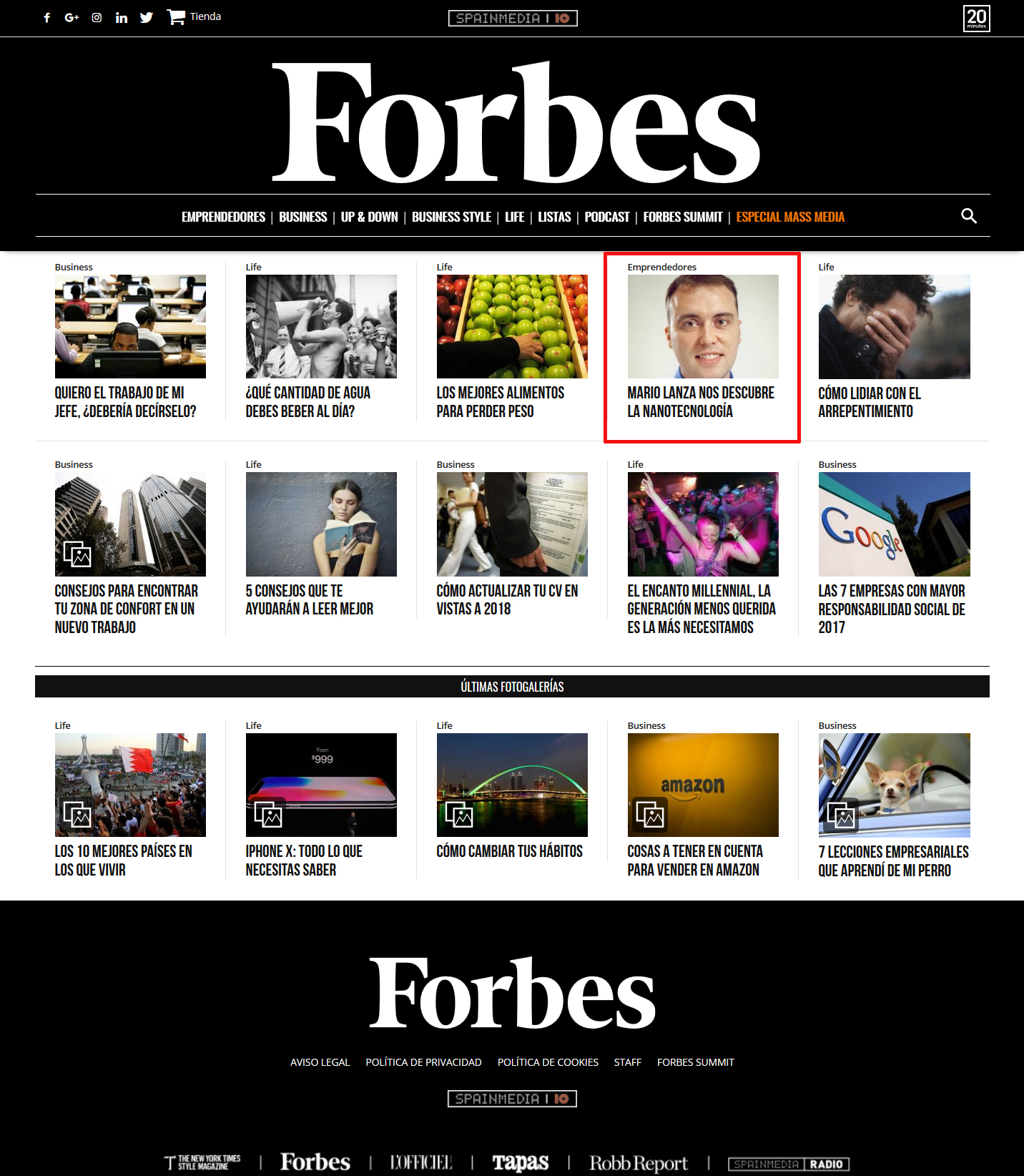2017年9月19日,国际著名杂志“福布斯”(Forbes) 发表了对我院特聘副教授Mario Lanza博士的专访报道。在这次访问中,Lanza教授阐述了纳米技术在当代社会中发挥的积极作用,并介绍了近些年来课题组在信息技术领域的工作,以及对于基于二维材料的非易失性存储器件的近期研究进展,其中包括已获560万投资的微机电系统器件专利。Lanza教授探讨了纳米技术在其它领域的优势,如纺织、食品工程和纳米医学等领域。最后,Lanza教授还强调了其在中国以及苏州大学获得的良好科研支撑,特别在科研经费和人力方面。
报道链接:http://forbes.es/emprendedores/31659/mario-lanza-nos-descubre-la-nanotecnologia/

福布斯杂志报道全文
Ifwe talk about nanotechnology, it seems that we are putting on the table anacademic issue that has little to do with the lives of ordinary people. Thereis the concept that nanotechnology is a scientific revolution of a few thatpretend to create futuristic and little useful devices. Nothing further fromreality, nanotechnology is basic to live in today's society. All electronicdevices we use daily contain electronic components of nanometer size. Thesedevices have allowed the creation of countless jobs, and have improved ourefficiency. In addition, new areas such as medicine, food or the textileindustry are benefiting from these discoveries.
Mario Lanza is an expert in thisarea of work, not only for his studies, also thanks to the experience he hasbeen able to acquire around the world. Originally from Barcelona, he finishedhis studies in Higher Engineering in his native city, as well as the Master andDoctorate, which he combined with his first international experiences in theprofessional world. From Peking University to Silicon Valley to Stanford, at theage of 30 he began to run his own research group at Soochow University (China),and shortly thereafter the Chinese government granted him very generous fundingto develop several projects. "I currently run a team of 20researchers," he says.
At the moment, Prof. Lanza works in nanotechnologyapplied to the field of information, his specialty. "We manufactureelectronic memories capable of storing large amounts of data in tiny spaces.What we do is to introduce advanced materials (suchas graphene) to further increase its performance (speed, consumption, duration)and provide new functionalities (flexibility, transparency)." Recently,one of her students has developed a current sensor to analyze materials andnanoelectronic devices that has a life time a hundred times longer thanstandard sensors. This project has been welcomed in the market, making Chineseinvestors have given almost a million Euros to optimize and market this newtechnology. "Hopefully in a few years all the nanoelectronic laboratories will use them," he says excitedly.
Nanotechnology and the 21st Century
The development of nanotechnology in the last decade has been spectacular, but Prof. Lanza believes that it is a path that has just begun tomove. "Every time we develop a new material or device opens a wide rangeof possible applications." Fortunately, developed countries are investingheavily in nanotechnology, and in general this is a rising sector in whichthere are more and more jobs.
As we have already mentioned, the benefits of nanotechnology are seen day byday in our society, although work and investment do not guarantee success sincethe problems to solve are very complex. Traditionally, the sector that has madethe most progress thanks to nanotechnology is computing. The invention ofmicroprocessors has made it possible to develop the working tools of millionsof people: computers, telephones, internet ... "In this field there arestill many things to invent, such as neuromorph systems (which simulateneuronal brain functioning) or quantum computers (which are based on themovement of discrete atoms)." Prof. Lanza clarifies.
Right now the biggest investments are directed to nanomedicine, so one of thesectors that has noticed this evolution is medicine. "Nanotechnologyapplied to the field of medicine has allowed the introduction of cameras,sensors and actuators in the body, manipulate cells individually andapply treatments locally to avoid side effects in other parts of thebody."
更多信息:http://forbes.es/
责任编辑:向丹婷